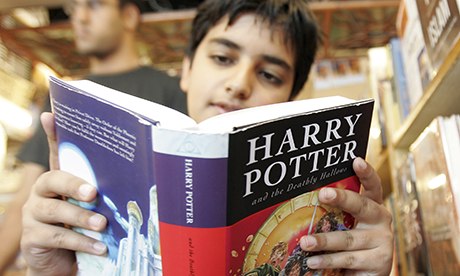|
| ||||||||||||||||||||||||||||
|
||||||||||||||||||||||||||||
|
|
||||||||||||||||||||||||||||
"Literature" versus "literature"In one sense, the term literature refers to any kind of printed material, ranging from great novels and poems to mundane circulars and handbills. But in other senses, the word literature also defines multiple kinds of literary formats and styles ranging from novels to handbills; in fact, the word literature has numerous meanings. To avoid confusion where creative writing is concerned, it's necessary to keep distinctions like these in mind.
The Muse refers to these two special senses of the word literature as:
Each of these two kinds of literature has a unique purpose, objective, and role; each is a specific kind, category, collection, and body of literature. All written works fall into one or the other of these two categories. The Muse regards a thorough understanding of these two different kinds of literature as a prerequisite for a full appreciation of the concept of creative writing; it's crucial for the correct application of creative writing terminology, as well. The Muse explores these two kinds of literature in what follows. Literature spelled with a capital "l"Literature with a capital "L" is writing that is inventive, especially literature of recognized artistic value; it's writing of lasting value that imaginatively expresses ideas of permanent and universal interest. Literati consider writing like this to be literature; other kinds of writing do not deserve the name. To them it consists of written works intended for serious reading, such as serious novels, comic novels with serious intent, historical works, biography, and personal or contentious essays. Literature with a capital "L" can present knowledge that is either concrete or abstract; it can present knowledge that is either abstruse or simple. It can treat fictional subjects and objects or it can treat nonfictional subjects and objects. As a consequence, literature with a capital "L" can include writing that is both fictional and nonfictional. But not all Literature with a capital "L" is creative. A novel isn't automatically creative writing just because it's constructed as a fictitious prose narrative of considerable length and complexity, portraying characters and usually presenting a sequential organization of action and scenes; nor is a short story automatically creative writing just because it's constructed as prose fiction under 10,000 words long. To be creative a work of Literature must possess form and be expressive, as well as contain ideas of permanent and universal interest; it must be the product of an author's creative imagination and it must display originality of thought or expression. Regardless of a work's literary form or genre, a piece of literature isn't creative unless its author makes it so. So long as a piece of literature meets these criteria to a significant degree, it may be considered creative Literature, even if flawed to some degree. Literature spelled with a lowercase "l"Literature with with a lowercase "l" is everyday literature, literature not of lasting value. Clearly, in modern society quite a bit of writing is not literature with a capital "L." Cookbooks, diet and travel magazines and books, technical journals, and TV or billboard ads don't contain imaginative writing of permanent and universal interest. They don't count as literature with a capital "L," no matter how skillfully or cleverly they may be written. (Notes taped to the refrigerator also don't count unless they're heartbreakers.) Literary works with a lowercase 'l" have many purposes. They might seek to entertain or divert, to inform about what's happening now, or to pass the time of day. Some forms of literature with a lowercase "l" seek to lay out objective and impersonal facts about the world that seldom or never change. Works like these may be inventive or even demonstrate artistic value, but they are not writing of lasting value that imaginatively expresses ideas of permanent and universal interest. Hence, they are not works of Literature. Literature spelled with a lowercase "l" can present knowledge that is either concrete or abstract; it can present knowledge that is either abstruse or simple. It can treat fictional subjects and objects as well as nonfictional subjects and objects. As a consequence, literature with a lowercase "l" can include writing that is both fictional and nonfictional. Literature with a lowercase "l" can be writing that is creative or uncreative, depending upon its purpose and upon the quality of the author's contribution. literature as any kind of printed materialThe word literature is derived from the Latin words litteratus, meaning learned, scholarly, a person who can read and write, a person familiar with literature. Thus literature, being learned, and reading and writing are closely related ideas that apply both to written works and to the people who write themto the literati. What are these basic requirements for writing to be literature according to the literati?
By definition, to be literature a work must be written and read. Technically, that means that plays and other kinds of performances are excluded from this classification unless they are written primarily with the intention of being read, not acted, as in a play or opera. Also excluded on technical grounds are poems, which are written primarily to be heard, not read, and unwritten oral poems, such as the works of the classic bards. However, today most people ignore these technical considerations. Most contemporary experts agree that these kinds of considerations are dismissible fine points; the modern inclination is to apply the term literature to acted plays and to poetry read out loud, so long as these works meet all the other basic requirements for literature. more about the meaning of literature
| ||||||||||||||||||||||||||||
|
| ||||||||||||||||||||||||||||
Search this web site with Electricka's Search Tool:
tap or click here
Electricka's Theme Products
Shop At Cafe Press
This web site and
its contents are copyrighted by
Decision Consulting Incorporated (DCI).
All rights reserved. | ||||||||||||||||||||||||||||

 Two
of literature's various meanings are especially significant. For the
sake of clarity, The Muse Of Literature considers it essential
to understand and distinguish between them.
Two
of literature's various meanings are especially significant. For the
sake of clarity, The Muse Of Literature considers it essential
to understand and distinguish between them. 


